高考英语 语法 名词复习课件(共52张)
文档属性
| 名称 | 高考英语 语法 名词复习课件(共52张) | 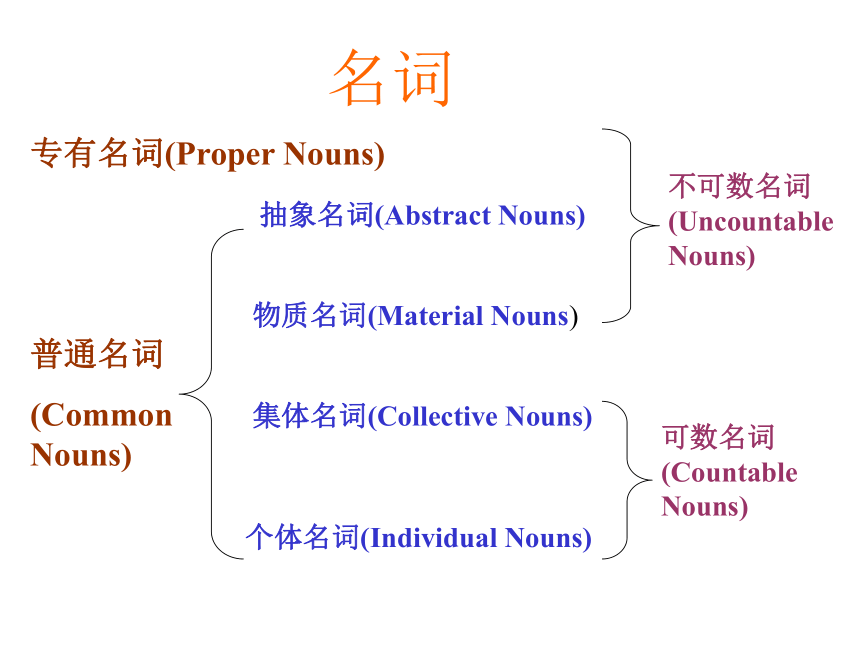 | |
| 格式 | zip | ||
| 文件大小 | 536.3KB | ||
| 资源类型 | 教案 | ||
| 版本资源 | 通用版 | ||
| 科目 | 英语 | ||
| 更新时间 | 2019-05-28 20:24:30 | ||
图片预览

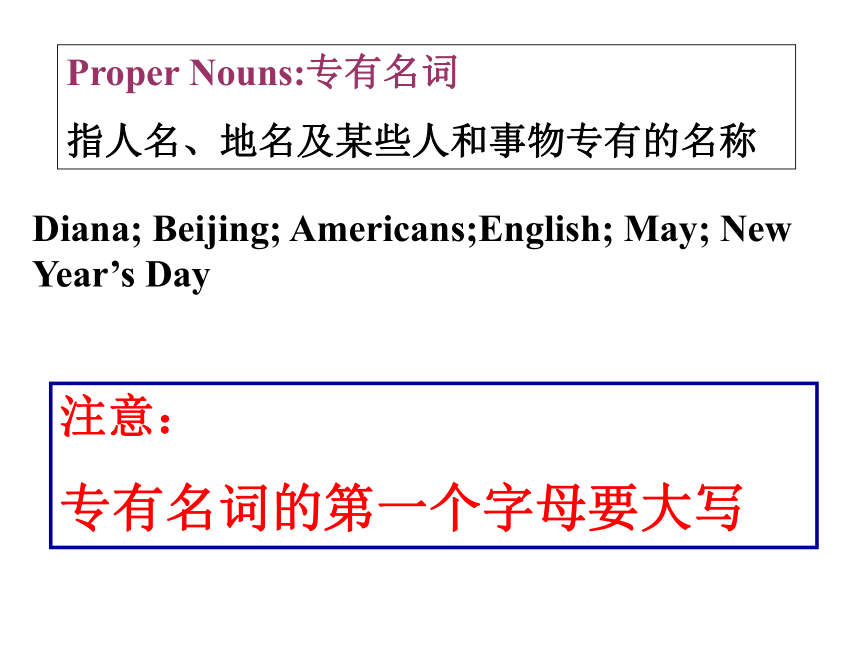
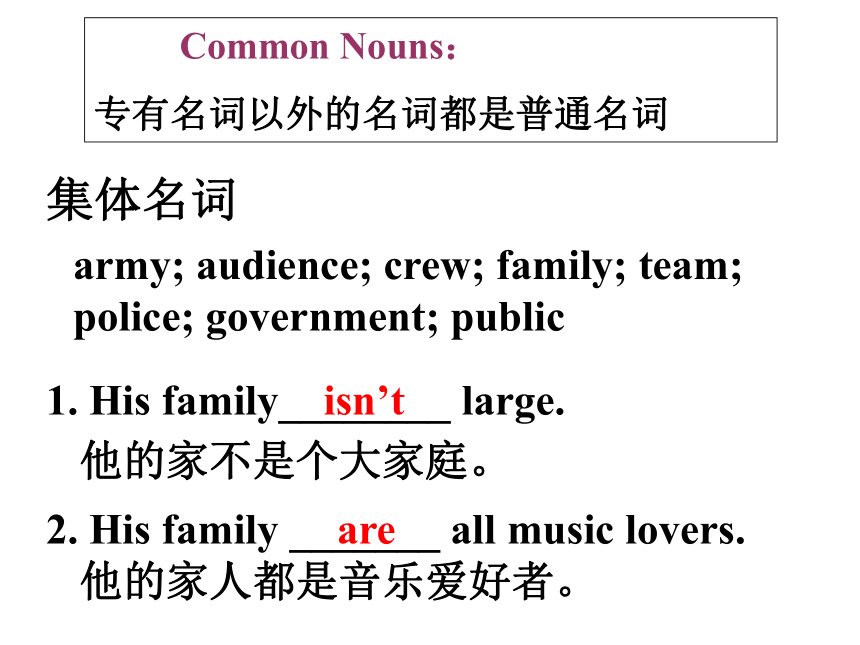

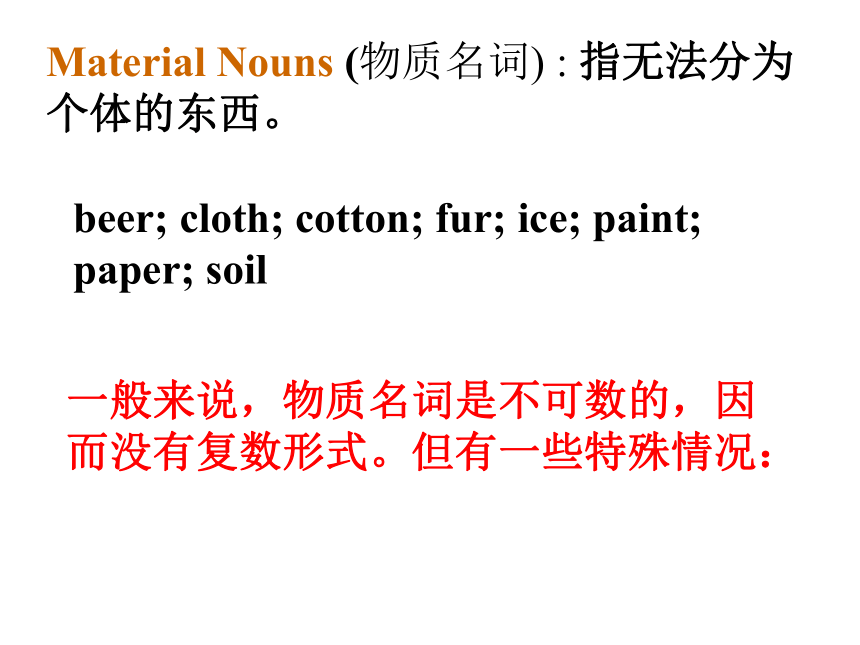
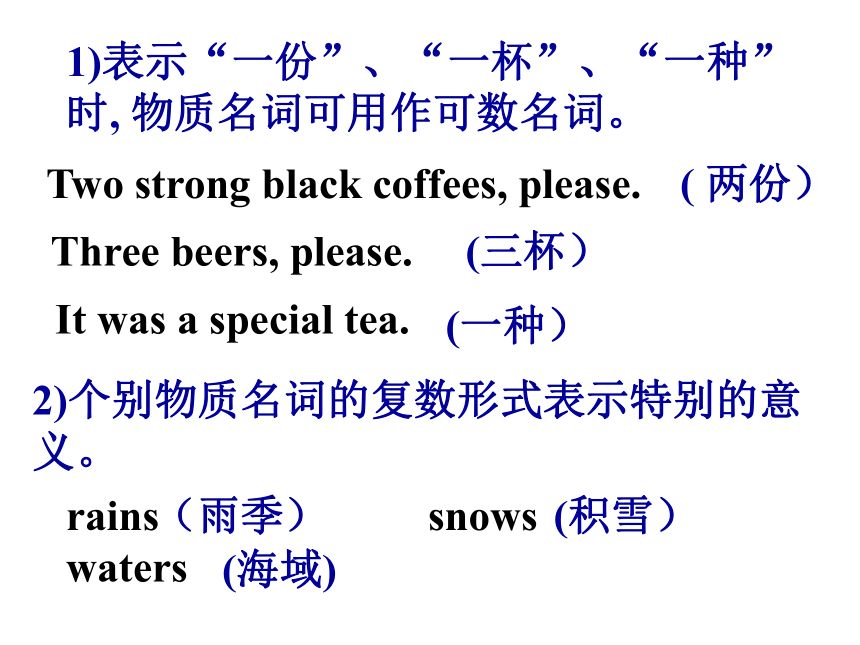
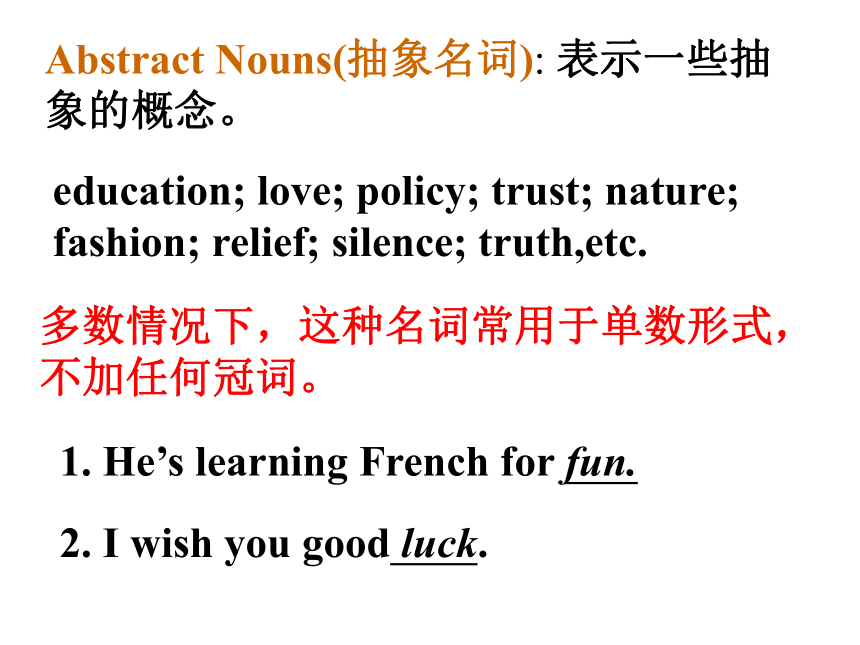
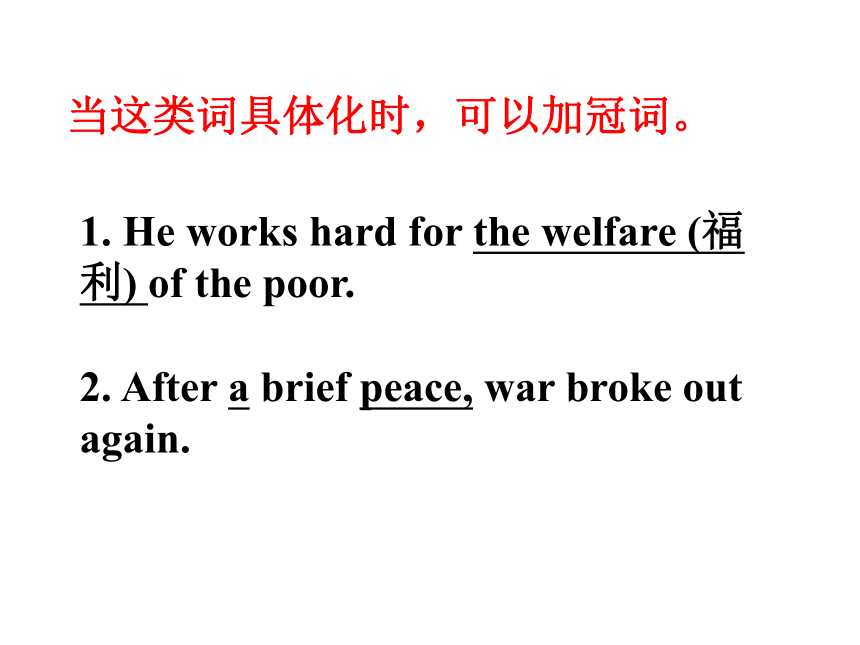
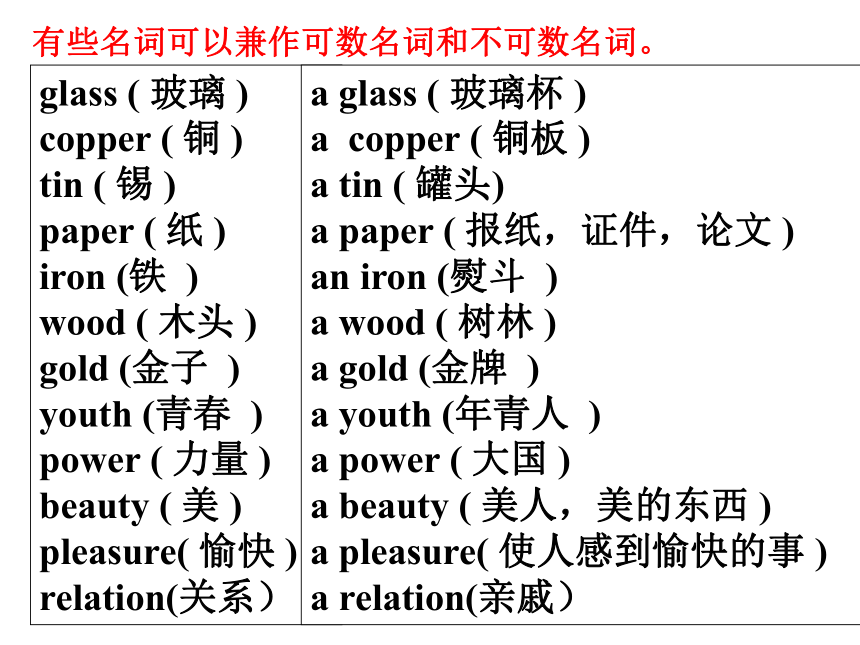
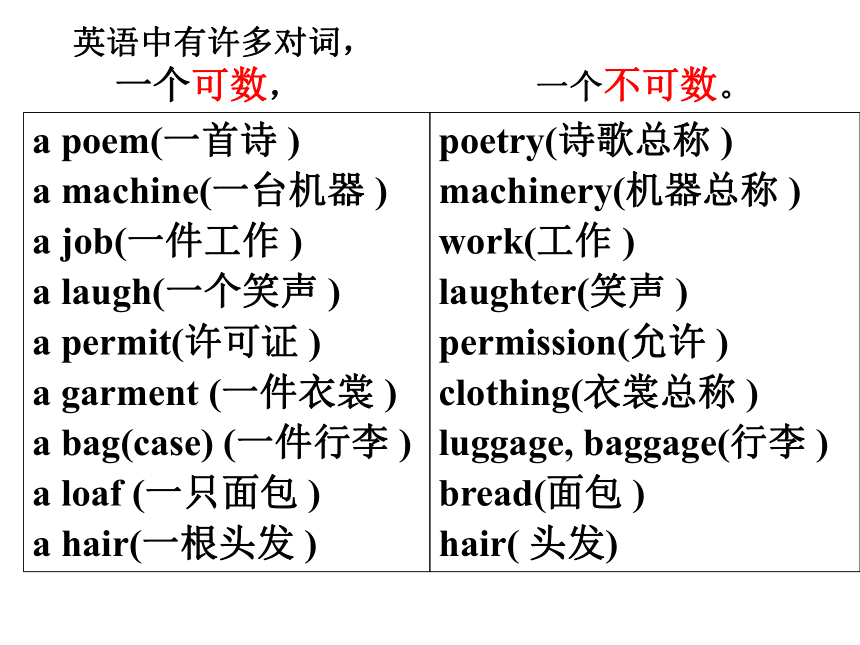
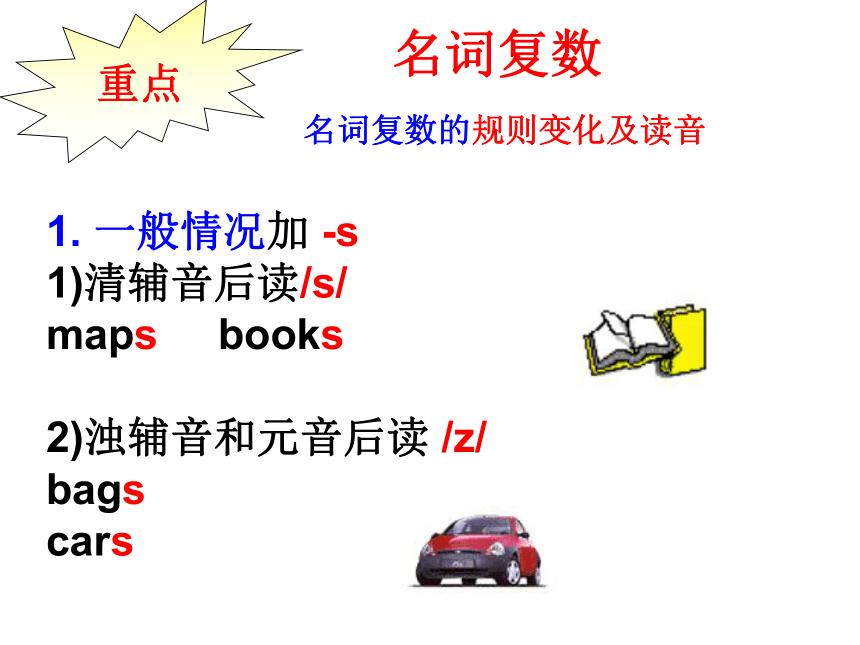

文档简介
课件52张PPT。名词专有名词(Proper Nouns)普通名词
(Common Nouns)个体名词(Individual Nouns)集体名词(Collective Nouns)物质名词(Material Nouns)抽象名词(Abstract Nouns)不可数名词(Uncountable Nouns)
可数名词(Countable Nouns)Proper Nouns:专有名词
指人名、地名及某些人和事物专有的名称Diana; Beijing; Americans;English; May; New Year’s Day注意:
专有名词的第一个字母要大写 Common Nouns:
专有名词以外的名词都是普通名词集体名词army; audience; crew; family; team; police; government; public1. His family________ large.2. His family _______ all music lovers.他的家不是个大家庭。
他的家人都是音乐爱好者。isn’tare在不少情况下,集体名词后单复数动词都可以用,没什么差别。The audience _____________ excited by the show.was/ were集体名词有时作单数看待,有时作复数看。一般来说,视为整体时作单数看,突出它的成员时作复数看。Material Nouns (物质名词) : 指无法分为个体的东西。beer; cloth; cotton; fur; ice; paint; paper; soil一般来说,物质名词是不可数的,因而没有复数形式。但有一些特殊情况:1)表示“一份”、“一杯”、“一种”时, 物质名词可用作可数名词。Two strong black coffees, please. Three beers, please. It was a special tea. 2)个别物质名词的复数形式表示特别的意义。rains snows waters( 两份)(三杯)(一种)(雨季)(积雪)(海域)Abstract Nouns(抽象名词): 表示一些抽象的概念。education; love; policy; trust; nature; fashion; relief; silence; truth,etc.多数情况下,这种名词常用于单数形式,不加任何冠词。1. He’s learning French for fun.2. I wish you good luck.当这类词具体化时,可以加冠词。1. He works hard for the welfare (福利) of the poor. 2. After a brief peace, war broke out again. 有些名词可以兼作可数名词和不可数名词。glass ( 玻璃 )
copper ( 铜 )
tin ( 锡 )
paper ( 纸 )
iron (铁 )
wood ( 木头 )
gold (金子 )
youth (青春 )
power ( 力量 )
beauty ( 美 )
pleasure( 愉快 )
relation(关系)a glass ( 玻璃杯 )
a copper ( 铜板 )
a tin ( 罐头)
a paper ( 报纸,证件,论文 )
an iron (熨斗 )
a wood ( 树林 )
a gold (金牌 )
a youth (年青人 )
a power ( 大国 )
a beauty ( 美人,美的东西 )
a pleasure( 使人感到愉快的事 )
a relation(亲戚) 英语中有许多对词,
一个可数, 一个不可数。a poem(一首诗 )
a machine(一台机器 )
a job(一件工作 )
a laugh(一个笑声 )
a permit(许可证 )
a garment (一件衣裳 )
a bag(case) (一件行李 )
a loaf (一只面包 )
a hair(一根头发 )poetry(诗歌总称 )
machinery(机器总称 )
work(工作 )
laughter(笑声 )
permission(允许 )
clothing(衣裳总称 )
luggage, baggage(行李 )
bread(面包 )
hair( 头发)1. 一般情况加 -s
1)清辅音后读/s/
maps books
2)浊辅音和元音后读 /z/
bags cars名词复数的规则变化及读音重点名词复数2. 以s, sh, ch, x 等结尾的词加 –es,读 /iz/ buses dishes watches boxes
特例:以 –ch 结尾的名词发音为 [k]时,只加 –s,读 /s/。
stomachs 3. 以ce, se, ze, (d)ge 等结尾的词加 –s, es 读 /iz/ cases bridges exercises changes
名词复数的规则变化及读音5. 以y 结尾的专有名词,或元音字母+y 结尾的名词变复数时,直接加-s变复数:读 /z/ two Marys the Henrys monkeys
holidays 4. 以辅音字母+y结尾的词变y 为i 再加es, ies 读 /iz/
party-parties baby---babies名词复数的规则变化及读音6. 以f 或 fe 结尾的名词变复数时: a. 加-s 读 /s/
roofs gulfs chiefs safes cliffs beliefs
b. 去f, fe 加-ves,读 /vz/
half-halves knife-knives self-selves
leaf-leaves wolf-wolves shelf-shelves
life-lives thief-thieves wife-wives
c. 均可 handkerchief -- handkerchiefs / handkerchieves
hoof(蹄)-hoofs/hooves名词复数的规则变化及读音妻子(wife)在书架(shelf)上拿了一片叶子(leaf)当做小刀(knife)把小偷(thief)当做狼(wolf)劈成两半(half)后自己(self)逃命(life)了。 一个首领(chief)带着一个信念(belief)在海湾(gulf)的悬崖(cliff)上发现一个屋顶(roof)上面有个保险箱(safe)。7. 字母o结尾,有生命的加 es,无生命的加s,读 /z/。tomatoespotatoesheroespianos photos kilos tobaccos radios zoos bamboos名词复数的规则变化及读音foot- feettooth -teeth名词复数的不规则变化(1)goose-geesechild - childrenmouse - miceox-oxen+enman -- menwoman -- womenmen doctorswomen teachers只要是含man的, 复数为men, 如名词有man或woman修饰的,变成复数时两个词都要变成复数。单数复数basis
analysis
bacterium
datum
medium
phenomenonbases
analyses
bacteria
data
media
phenomena名词复数的不规则变化(2):单复数形式相同sheep deer means(方法) series (系列) species works(著作,工厂) Chinese Japanese国家人的名词需要记住三种情况:
1、单复数同形:Chinese; Japanese; Swiss
2、需要变形:English - Englishman
3、加 –s 或 -es:German – Germans
中日不变英法变,其余S加后面。1.6 不同国家的人的单复数
名称 总称(谓语用复数) 一个人 两个人 中国人 the Chinese a Chinese two Chinese 日本人 the Japanese a Japanese two Japanese 瑞士人 the Swiss a Swiss two Swiss
英国人 the English an Englishman two Englishmen
法国人 the French a Frenchman two Frenchmen
美国人 the Americans an American two Americans
德国人 the Germans a German two Germans 加拿大人 the Canadians a Canadian two Canadians
澳大利亚人the Australians an Australian two Australians 俄国人 the Russians a Russian two Russians 印度人 the Indians an Indian two Indians
意大利人 the Italians an Italian two Italians 希腊人 the Greek a Greek two Greeks 瑞典人 the Swedish a Swede two Swedes _______ will make a trip around the world during the coming Christmas.
A. The Evens B. The Evens’
C. The Evenses D. The Evenses’专有名词的复数与定冠词连用,常用来表示“一家人”或一家之中的两个或几个重要的人。Mr Smith has two ______, both of whom are teachers in a school.
A.brothers-in-law
B.brother-in-laws
C.brothers-in-laws
D.brothers-in law
以连字符号连接的合成名词一般将中心名词变成复数,如:managers-in-chief; fathers-in-law。如果没有中心名词就在该合成词的最后加 –s。如:grown-ups。以s结尾的复数名词后只加撇号不加s。
如:teachers’ office。
2. 表示两个或多人共有的,在最后一个名词后加’s。
如:Tom and John’s room。
3. 在表示店铺或教堂的名字或某人的家时,名词所有格的后面常常不出现它所修饰的名词,
如:the barber's 理发店。名词的所有格 名词的所有格有两种形式:’s式和of式。一般说来,表示有生命的名词和表示时间、国家、距离等的名词的所有格用’s,但还须注意以下几点:1.Miss Smith is a friend of________. A. Mary's mother's??? B. Mary's mother??
C. Mother's of Mary??? D. Mary mother's
2. -Where’s your brother? -At _____. A. Mr. Green’s?????? B. Mr. Green??
C. the Mr. Green’s? D. the Mr. Green
3.—I wonder whose bicycle it is. —It might be my________ A. neighbour's???? B. neighbour?
C. neighbours 1. Tom is a worker. ( )
2. The Children’s Palace is near Jane’s home. ( )
3. She gave me some good advice.
( )主语,介词宾语动词宾语名词在句中所做的成分主语,表语4. He didn’t go there because of his illness.
( )
5. We made Tom our monitor. ( )
6. We students should study hard. ( )介词宾语宾语补足语同位语7. The author’s name is on the cover of the book. ( )
8. This book is of great use. ( )主语,介词宾语主语,介词宾语可数与不可数名词的修饰语只修饰可数名词的有each, either, neither, another, these, those, both, (a) few, several, many, a great /good many, a large number of, scores of, dozens of等。2. 只修饰不可数的有(a) little, much, a bit of, a great deal of, a large amount of等。
3. 修饰可数和不可数名词的有some, any, half, most, all, a lot of, lots of, plenty of, a large quantity of, quantities of等。名词在高考中的运用 Divorced men must pay money for their children and sometimes pay alimony to their wives .
money B. dresses
C. attention D. visits2. Please answer the questions in the questionnaire and write down the advice if you’ve got any.
book B. picture C. exam
D. a written list of questions__________名词在阅读中的猜词上下文词根________ 名词在完型填空中的运用:
1. We’ve missed the last bus. I’m afraid we have no ______ but to take a taxi.
way B. choice
C. possibility D. selection
2. I am sure David will be able to find the library — he has a pretty good _______ of direction.
A.idea B.feeling
C.experience D.sense
3. When the bell rang and the teacher closed his book , it was a ___for everyone to stand up.
chance B. mark C. way D. signal
4. Carelessness is the usual _____of fire.
A. reason B. cause C. excuse D. origin意思? 搭配? 内涵区别?1. (18.全国I) But for tourists like me, pandas are its ___________ (attract).
2. (17.全国I) The nursery team switches him every few ________ (day) with his sister so that while one is being bottle-fed.
3. (18.全国II) Then, handle the most important tasks first so you'll feel a real sense of ________________ (achieve).attraction days achievement 名词在语法填空中的运用:4. (16.全国II) Recent __________ (study) show that we are far more productive at work if we take short break regularly.
5. (16.四川) Any smell might attract natural ___________ (enemy) that would try to eat the little panda.
6. (18.浙江) It is important to pay your electricity bill on time, as late _________ (pay) may affect your credit.studies enemies payments 7. (16.浙江) We can achieve a lot when we learn to let our _________ (different) unite, rather than divide us.
8. (17.全国I) I'd skipped nearby Guilin, a dream place for... the Li River that are pictured by artists in so many Chinese _________ (painting) in which you laugh at her.differencespaintings 可数,不可数?单数,复数 ?所有格?
看句中的相关冠词和谓语的单复数和句意来判断。1.(全国I) My uncle tells me that the key to his success is honest.
2.(全国II) If we go on a trip abroad, we can broaden our view and gain knowledges we cannot get from books.
3.(四川) Mom has a full-time job, but she has to do most of the houseworks.名词在改错中的运用honestyknowledgehousework4.(全国I) The airs we breathe in is getting dirtier and dirtier.
5.(全国II) One day, little Tony went to a shopping center with his parent... he turned around and found that his parents were missing.
6.(全国I)...since then-- for all these year--we have been allowing tomatoes to self seed where they please.airparentsyears1. Here I will give you some advices on how to build up friendship.
2. Teacher and parent express their congratulations and expectation.
3. I hope all the person have good table manners .
名词在写作中的运用peopleadvice1.可数 不可数? 2.单数 复数? 3. 复数形式?ss看一轮,二轮复习练习一、完成句子根据汉语提示, 完成下列句子。
1. Two __________ (月) ago,three __________ (英雄) caught four ___________ (小偷).They made them plant some ____________ (土豆) and ____________(竹子) in two _______ (动物园). They also made their ________(妻子们) return the four big ___________(箱子)with some precious ___________ (照片)and _________ (刷子)in them.monthsheroesthieves potatoesbambooszooswivesboxes photosrevisionbrushes2. Two _____________________(主编),three __________________ (男教师) and five ____________________ (女医生), together with their ______________(孩子们), went to the market. They decided to buy two __________(绵羊), three ________(鹿), four _________(公牛), five __________(鹅)and six white _________(老鼠)with three ________ (脚) and six _________(牙齿).teetheditors-in-chiefmen teacherswomen doctors children sheepdeer oxengeesemice feet1. All the teacher and student attended the grown-up ceremony.
2. A Student made a speaking for us.
3. Good listen can show respect
and promote understanding .
改一改 slisteningspeechs名词所有格的一些俚语:I’ll take the risk for friendship’s sake.
She was at her wit’s end.
Now they could sing at their heart’s content.
We should get the children out of harm’s way.
We had best keep them at arm’s length.
For goodness’ sake,stop arguing.
Jane got the money’s worth out of the coat.
(为了友谊)(黔驴技穷)(尽情地)(不受损害)(保持距离)(看在上帝的份上)(很合算)主谓一致1。语法形式上的一致(主单谓单;主复谓复)2。意义上的一致(主语形单意复,谓语用复数。Eg:people;police)
(主语形复意单,谓语用单数。Eg: news;economics) 3.就近原则: either…or; neither…nor; not only…but also4. 单复数视情况而定。
1)集体名词作主语:强调整体,用单数;强调个体,用复数2)单复数同形名词作主语,按意义一致原则。Eg:means,species3)中心词是all, most, half, rest时,按意义一致原则。即主语单数意义,谓语用单数;主语复数意义,谓语用复数。
4)主语是and连接两个名词时,指一样东西,谓语单数;指两样东西,谓语复数。Eg: A knife and fork is on the table. 5)代词作主语,取决于它代替的是单数还是复数。意义一致原则。Eg: ours, yours; such, the same; who, that, which; any, either, neither,(单独作主语,谓语单数) none, all, some, more, 6)分数,量词,half of, part of 作主语,于中心词保持一致。7)what 引导的主语从句。通常用单数;所指的具体内容为复数时,谓语用复数。8)主谓倒装,谓语与其后主语一致。5。 谓语用单数的情况。1)名词所有格之后的名词被省略。(指商店,工场,住宅等)作主语。Eg: The doctor’s, my uncle’s, the baker’s2) 中心词是时间、距离、金额、度量、书名等复数名词。Eg: three years; The selected poems of Li Bai; 3) each, every, no 所修饰名词,即使以and 或逗号连接。
Eg: each boy and each girl ; every man and woman4) 主语有more than one…; many a 5) a kind of; a pair of; a series of…6) This kind of…7) The number of…8) A great deal of…; a large amount of… +un9) One and a half +可数名词复数
eg: One and a half bananas is left on the table. 10) The departed (死者)意义上指个体11) the only one of +可数名词复数+定语从句。从句中的谓语用单数。6。谓语用复数的情况。1)police,;people;cattle; militia(民兵)作主语。2)有两个部分构成的名词。(表示衣物或工具)eg: glasses; chopsticks…3)these kind of men(口语); men of this kind 作主语4) both…and…. 修饰主语5) A number of; large quantities of; large amounts of修饰主语6) the+ 形容词作主语,一般情况下7) one of the+可数名词复数+定语从句,从句中谓语动词用复数。Assignment:1. Try to learn these words by heart: (通常用于复数形式的词)scissors剪刀; pants裤子; contents目录
compasses两脚规; cords灯心絨裤; arms武器
earphones耳机; pyjamas睡衣裤; ashes灰烬
scales天平; overalls工装裤; tropics热带
spectacles眼镜; braces背带; stairs楼梯
nail-clippers指甲刀; slacks便装裤; brains头脑
belongings所有物; savings积蓄; tidings消息
doings行为; writings作品; findings调查结果
Add the words in your note paper. Some ______ visited our school last Wednesday.
A.German B.Germen
C.Germans D.Germens?1. Here’s my card. Let’s keep in ______.
A. touch B. relation
C. connection D. friendship
2. You can take as many as you like because they are free of ___.
A. fare B. charge C. money D. pay
3. I keep medicines on the top shelf, out of the children’s ______.
A reach B hand C hold D place
(Common Nouns)个体名词(Individual Nouns)集体名词(Collective Nouns)物质名词(Material Nouns)抽象名词(Abstract Nouns)不可数名词(Uncountable Nouns)
可数名词(Countable Nouns)Proper Nouns:专有名词
指人名、地名及某些人和事物专有的名称Diana; Beijing; Americans;English; May; New Year’s Day注意:
专有名词的第一个字母要大写 Common Nouns:
专有名词以外的名词都是普通名词集体名词army; audience; crew; family; team; police; government; public1. His family________ large.2. His family _______ all music lovers.他的家不是个大家庭。
他的家人都是音乐爱好者。isn’tare在不少情况下,集体名词后单复数动词都可以用,没什么差别。The audience _____________ excited by the show.was/ were集体名词有时作单数看待,有时作复数看。一般来说,视为整体时作单数看,突出它的成员时作复数看。Material Nouns (物质名词) : 指无法分为个体的东西。beer; cloth; cotton; fur; ice; paint; paper; soil一般来说,物质名词是不可数的,因而没有复数形式。但有一些特殊情况:1)表示“一份”、“一杯”、“一种”时, 物质名词可用作可数名词。Two strong black coffees, please. Three beers, please. It was a special tea. 2)个别物质名词的复数形式表示特别的意义。rains snows waters( 两份)(三杯)(一种)(雨季)(积雪)(海域)Abstract Nouns(抽象名词): 表示一些抽象的概念。education; love; policy; trust; nature; fashion; relief; silence; truth,etc.多数情况下,这种名词常用于单数形式,不加任何冠词。1. He’s learning French for fun.2. I wish you good luck.当这类词具体化时,可以加冠词。1. He works hard for the welfare (福利) of the poor. 2. After a brief peace, war broke out again. 有些名词可以兼作可数名词和不可数名词。glass ( 玻璃 )
copper ( 铜 )
tin ( 锡 )
paper ( 纸 )
iron (铁 )
wood ( 木头 )
gold (金子 )
youth (青春 )
power ( 力量 )
beauty ( 美 )
pleasure( 愉快 )
relation(关系)a glass ( 玻璃杯 )
a copper ( 铜板 )
a tin ( 罐头)
a paper ( 报纸,证件,论文 )
an iron (熨斗 )
a wood ( 树林 )
a gold (金牌 )
a youth (年青人 )
a power ( 大国 )
a beauty ( 美人,美的东西 )
a pleasure( 使人感到愉快的事 )
a relation(亲戚) 英语中有许多对词,
一个可数, 一个不可数。a poem(一首诗 )
a machine(一台机器 )
a job(一件工作 )
a laugh(一个笑声 )
a permit(许可证 )
a garment (一件衣裳 )
a bag(case) (一件行李 )
a loaf (一只面包 )
a hair(一根头发 )poetry(诗歌总称 )
machinery(机器总称 )
work(工作 )
laughter(笑声 )
permission(允许 )
clothing(衣裳总称 )
luggage, baggage(行李 )
bread(面包 )
hair( 头发)1. 一般情况加 -s
1)清辅音后读/s/
maps books
2)浊辅音和元音后读 /z/
bags cars名词复数的规则变化及读音重点名词复数2. 以s, sh, ch, x 等结尾的词加 –es,读 /iz/ buses dishes watches boxes
特例:以 –ch 结尾的名词发音为 [k]时,只加 –s,读 /s/。
stomachs 3. 以ce, se, ze, (d)ge 等结尾的词加 –s, es 读 /iz/ cases bridges exercises changes
名词复数的规则变化及读音5. 以y 结尾的专有名词,或元音字母+y 结尾的名词变复数时,直接加-s变复数:读 /z/ two Marys the Henrys monkeys
holidays 4. 以辅音字母+y结尾的词变y 为i 再加es, ies 读 /iz/
party-parties baby---babies名词复数的规则变化及读音6. 以f 或 fe 结尾的名词变复数时: a. 加-s 读 /s/
roofs gulfs chiefs safes cliffs beliefs
b. 去f, fe 加-ves,读 /vz/
half-halves knife-knives self-selves
leaf-leaves wolf-wolves shelf-shelves
life-lives thief-thieves wife-wives
c. 均可 handkerchief -- handkerchiefs / handkerchieves
hoof(蹄)-hoofs/hooves名词复数的规则变化及读音妻子(wife)在书架(shelf)上拿了一片叶子(leaf)当做小刀(knife)把小偷(thief)当做狼(wolf)劈成两半(half)后自己(self)逃命(life)了。 一个首领(chief)带着一个信念(belief)在海湾(gulf)的悬崖(cliff)上发现一个屋顶(roof)上面有个保险箱(safe)。7. 字母o结尾,有生命的加 es,无生命的加s,读 /z/。tomatoespotatoesheroespianos photos kilos tobaccos radios zoos bamboos名词复数的规则变化及读音foot- feettooth -teeth名词复数的不规则变化(1)goose-geesechild - childrenmouse - miceox-oxen+enman -- menwoman -- womenmen doctorswomen teachers只要是含man的, 复数为men, 如名词有man或woman修饰的,变成复数时两个词都要变成复数。单数复数basis
analysis
bacterium
datum
medium
phenomenonbases
analyses
bacteria
data
media
phenomena名词复数的不规则变化(2):单复数形式相同sheep deer means(方法) series (系列) species works(著作,工厂) Chinese Japanese国家人的名词需要记住三种情况:
1、单复数同形:Chinese; Japanese; Swiss
2、需要变形:English - Englishman
3、加 –s 或 -es:German – Germans
中日不变英法变,其余S加后面。1.6 不同国家的人的单复数
名称 总称(谓语用复数) 一个人 两个人 中国人 the Chinese a Chinese two Chinese 日本人 the Japanese a Japanese two Japanese 瑞士人 the Swiss a Swiss two Swiss
英国人 the English an Englishman two Englishmen
法国人 the French a Frenchman two Frenchmen
美国人 the Americans an American two Americans
德国人 the Germans a German two Germans 加拿大人 the Canadians a Canadian two Canadians
澳大利亚人the Australians an Australian two Australians 俄国人 the Russians a Russian two Russians 印度人 the Indians an Indian two Indians
意大利人 the Italians an Italian two Italians 希腊人 the Greek a Greek two Greeks 瑞典人 the Swedish a Swede two Swedes _______ will make a trip around the world during the coming Christmas.
A. The Evens B. The Evens’
C. The Evenses D. The Evenses’专有名词的复数与定冠词连用,常用来表示“一家人”或一家之中的两个或几个重要的人。Mr Smith has two ______, both of whom are teachers in a school.
A.brothers-in-law
B.brother-in-laws
C.brothers-in-laws
D.brothers-in law
以连字符号连接的合成名词一般将中心名词变成复数,如:managers-in-chief; fathers-in-law。如果没有中心名词就在该合成词的最后加 –s。如:grown-ups。以s结尾的复数名词后只加撇号不加s。
如:teachers’ office。
2. 表示两个或多人共有的,在最后一个名词后加’s。
如:Tom and John’s room。
3. 在表示店铺或教堂的名字或某人的家时,名词所有格的后面常常不出现它所修饰的名词,
如:the barber's 理发店。名词的所有格 名词的所有格有两种形式:’s式和of式。一般说来,表示有生命的名词和表示时间、国家、距离等的名词的所有格用’s,但还须注意以下几点:1.Miss Smith is a friend of________. A. Mary's mother's??? B. Mary's mother??
C. Mother's of Mary??? D. Mary mother's
2. -Where’s your brother? -At _____. A. Mr. Green’s?????? B. Mr. Green??
C. the Mr. Green’s? D. the Mr. Green
3.—I wonder whose bicycle it is. —It might be my________ A. neighbour's???? B. neighbour?
C. neighbours 1. Tom is a worker. ( )
2. The Children’s Palace is near Jane’s home. ( )
3. She gave me some good advice.
( )主语,介词宾语动词宾语名词在句中所做的成分主语,表语4. He didn’t go there because of his illness.
( )
5. We made Tom our monitor. ( )
6. We students should study hard. ( )介词宾语宾语补足语同位语7. The author’s name is on the cover of the book. ( )
8. This book is of great use. ( )主语,介词宾语主语,介词宾语可数与不可数名词的修饰语只修饰可数名词的有each, either, neither, another, these, those, both, (a) few, several, many, a great /good many, a large number of, scores of, dozens of等。2. 只修饰不可数的有(a) little, much, a bit of, a great deal of, a large amount of等。
3. 修饰可数和不可数名词的有some, any, half, most, all, a lot of, lots of, plenty of, a large quantity of, quantities of等。名词在高考中的运用 Divorced men must pay money for their children and sometimes pay alimony to their wives .
money B. dresses
C. attention D. visits2. Please answer the questions in the questionnaire and write down the advice if you’ve got any.
book B. picture C. exam
D. a written list of questions__________名词在阅读中的猜词上下文词根________ 名词在完型填空中的运用:
1. We’ve missed the last bus. I’m afraid we have no ______ but to take a taxi.
way B. choice
C. possibility D. selection
2. I am sure David will be able to find the library — he has a pretty good _______ of direction.
A.idea B.feeling
C.experience D.sense
3. When the bell rang and the teacher closed his book , it was a ___for everyone to stand up.
chance B. mark C. way D. signal
4. Carelessness is the usual _____of fire.
A. reason B. cause C. excuse D. origin意思? 搭配? 内涵区别?1. (18.全国I) But for tourists like me, pandas are its ___________ (attract).
2. (17.全国I) The nursery team switches him every few ________ (day) with his sister so that while one is being bottle-fed.
3. (18.全国II) Then, handle the most important tasks first so you'll feel a real sense of ________________ (achieve).attraction days achievement 名词在语法填空中的运用:4. (16.全国II) Recent __________ (study) show that we are far more productive at work if we take short break regularly.
5. (16.四川) Any smell might attract natural ___________ (enemy) that would try to eat the little panda.
6. (18.浙江) It is important to pay your electricity bill on time, as late _________ (pay) may affect your credit.studies enemies payments 7. (16.浙江) We can achieve a lot when we learn to let our _________ (different) unite, rather than divide us.
8. (17.全国I) I'd skipped nearby Guilin, a dream place for... the Li River that are pictured by artists in so many Chinese _________ (painting) in which you laugh at her.differencespaintings 可数,不可数?单数,复数 ?所有格?
看句中的相关冠词和谓语的单复数和句意来判断。1.(全国I) My uncle tells me that the key to his success is honest.
2.(全国II) If we go on a trip abroad, we can broaden our view and gain knowledges we cannot get from books.
3.(四川) Mom has a full-time job, but she has to do most of the houseworks.名词在改错中的运用honestyknowledgehousework4.(全国I) The airs we breathe in is getting dirtier and dirtier.
5.(全国II) One day, little Tony went to a shopping center with his parent... he turned around and found that his parents were missing.
6.(全国I)...since then-- for all these year--we have been allowing tomatoes to self seed where they please.airparentsyears1. Here I will give you some advices on how to build up friendship.
2. Teacher and parent express their congratulations and expectation.
3. I hope all the person have good table manners .
名词在写作中的运用peopleadvice1.可数 不可数? 2.单数 复数? 3. 复数形式?ss看一轮,二轮复习练习一、完成句子根据汉语提示, 完成下列句子。
1. Two __________ (月) ago,three __________ (英雄) caught four ___________ (小偷).They made them plant some ____________ (土豆) and ____________(竹子) in two _______ (动物园). They also made their ________(妻子们) return the four big ___________(箱子)with some precious ___________ (照片)and _________ (刷子)in them.monthsheroesthieves potatoesbambooszooswivesboxes photosrevisionbrushes2. Two _____________________(主编),three __________________ (男教师) and five ____________________ (女医生), together with their ______________(孩子们), went to the market. They decided to buy two __________(绵羊), three ________(鹿), four _________(公牛), five __________(鹅)and six white _________(老鼠)with three ________ (脚) and six _________(牙齿).teetheditors-in-chiefmen teacherswomen doctors children sheepdeer oxengeesemice feet1. All the teacher and student attended the grown-up ceremony.
2. A Student made a speaking for us.
3. Good listen can show respect
and promote understanding .
改一改 slisteningspeechs名词所有格的一些俚语:I’ll take the risk for friendship’s sake.
She was at her wit’s end.
Now they could sing at their heart’s content.
We should get the children out of harm’s way.
We had best keep them at arm’s length.
For goodness’ sake,stop arguing.
Jane got the money’s worth out of the coat.
(为了友谊)(黔驴技穷)(尽情地)(不受损害)(保持距离)(看在上帝的份上)(很合算)主谓一致1。语法形式上的一致(主单谓单;主复谓复)2。意义上的一致(主语形单意复,谓语用复数。Eg:people;police)
(主语形复意单,谓语用单数。Eg: news;economics) 3.就近原则: either…or; neither…nor; not only…but also4. 单复数视情况而定。
1)集体名词作主语:强调整体,用单数;强调个体,用复数2)单复数同形名词作主语,按意义一致原则。Eg:means,species3)中心词是all, most, half, rest时,按意义一致原则。即主语单数意义,谓语用单数;主语复数意义,谓语用复数。
4)主语是and连接两个名词时,指一样东西,谓语单数;指两样东西,谓语复数。Eg: A knife and fork is on the table. 5)代词作主语,取决于它代替的是单数还是复数。意义一致原则。Eg: ours, yours; such, the same; who, that, which; any, either, neither,(单独作主语,谓语单数) none, all, some, more, 6)分数,量词,half of, part of 作主语,于中心词保持一致。7)what 引导的主语从句。通常用单数;所指的具体内容为复数时,谓语用复数。8)主谓倒装,谓语与其后主语一致。5。 谓语用单数的情况。1)名词所有格之后的名词被省略。(指商店,工场,住宅等)作主语。Eg: The doctor’s, my uncle’s, the baker’s2) 中心词是时间、距离、金额、度量、书名等复数名词。Eg: three years; The selected poems of Li Bai; 3) each, every, no 所修饰名词,即使以and 或逗号连接。
Eg: each boy and each girl ; every man and woman4) 主语有more than one…; many a 5) a kind of; a pair of; a series of…6) This kind of…7) The number of…8) A great deal of…; a large amount of… +un9) One and a half +可数名词复数
eg: One and a half bananas is left on the table. 10) The departed (死者)意义上指个体11) the only one of +可数名词复数+定语从句。从句中的谓语用单数。6。谓语用复数的情况。1)police,;people;cattle; militia(民兵)作主语。2)有两个部分构成的名词。(表示衣物或工具)eg: glasses; chopsticks…3)these kind of men(口语); men of this kind 作主语4) both…and…. 修饰主语5) A number of; large quantities of; large amounts of修饰主语6) the+ 形容词作主语,一般情况下7) one of the+可数名词复数+定语从句,从句中谓语动词用复数。Assignment:1. Try to learn these words by heart: (通常用于复数形式的词)scissors剪刀; pants裤子; contents目录
compasses两脚规; cords灯心絨裤; arms武器
earphones耳机; pyjamas睡衣裤; ashes灰烬
scales天平; overalls工装裤; tropics热带
spectacles眼镜; braces背带; stairs楼梯
nail-clippers指甲刀; slacks便装裤; brains头脑
belongings所有物; savings积蓄; tidings消息
doings行为; writings作品; findings调查结果
Add the words in your note paper. Some ______ visited our school last Wednesday.
A.German B.Germen
C.Germans D.Germens?1. Here’s my card. Let’s keep in ______.
A. touch B. relation
C. connection D. friendship
2. You can take as many as you like because they are free of ___.
A. fare B. charge C. money D. pay
3. I keep medicines on the top shelf, out of the children’s ______.
A reach B hand C hold D place
